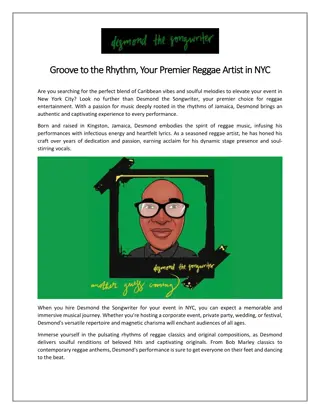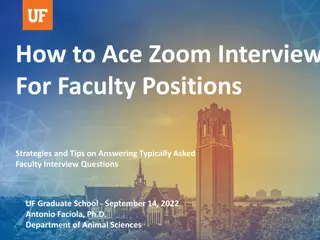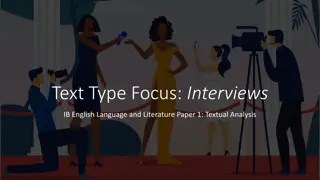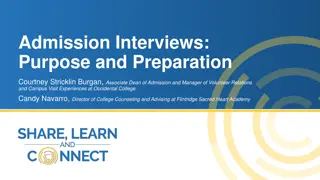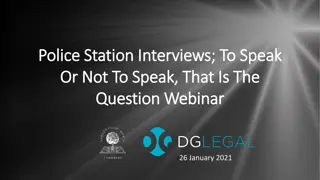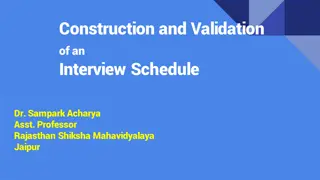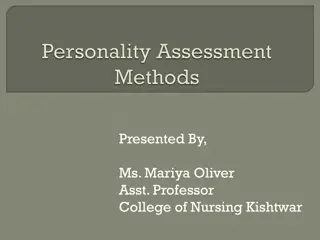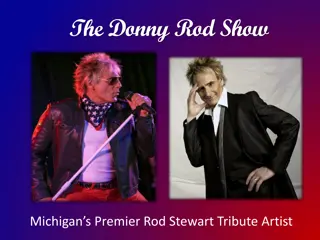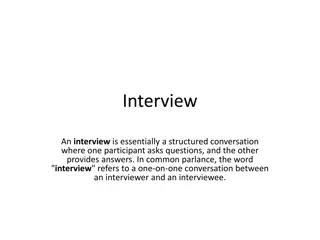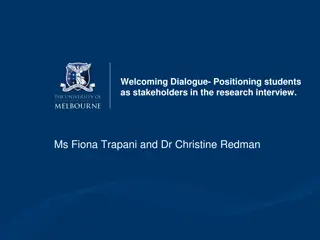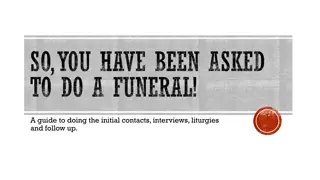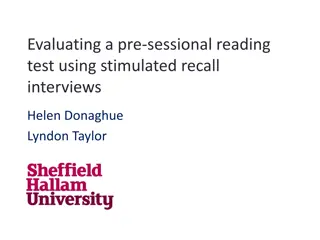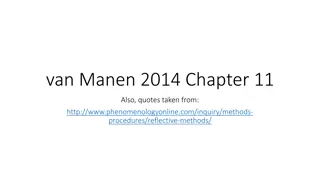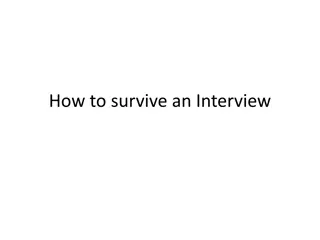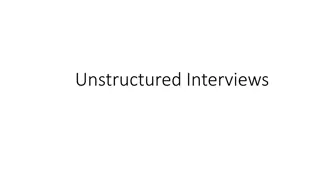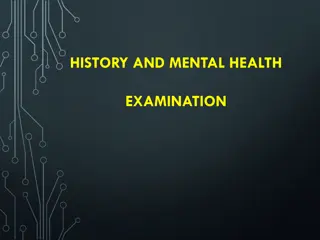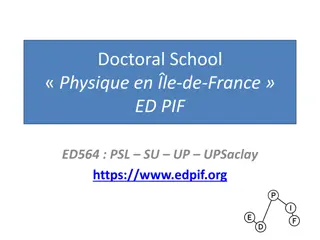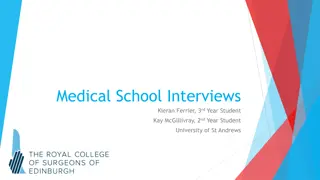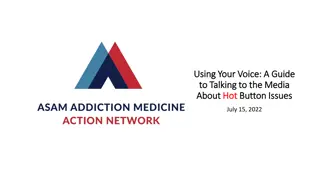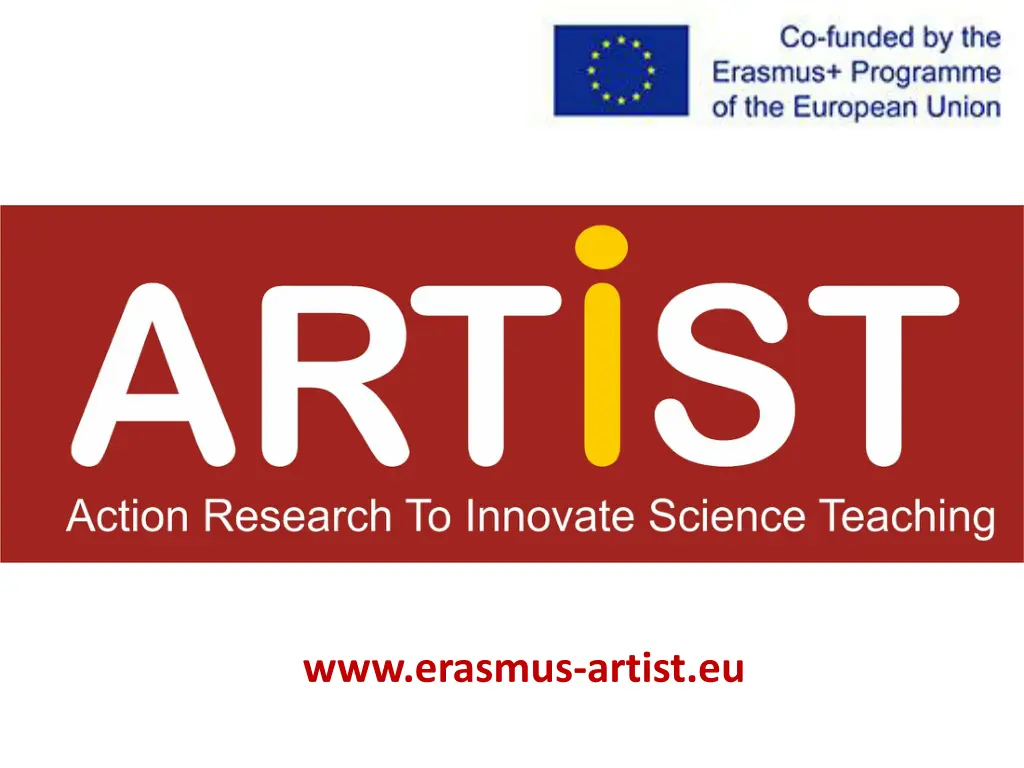
Understanding Action Research Methods for Student-Centered Learning
Explore the process of conducting interviews in action research methodology, focusing on student-centered learning in science education. Discover the goals, strategies, and challenges of using interviews to gain insights into individual thinking structures.
Download Presentation

Please find below an Image/Link to download the presentation.
The content on the website is provided AS IS for your information and personal use only. It may not be sold, licensed, or shared on other websites without obtaining consent from the author. If you encounter any issues during the download, it is possible that the publisher has removed the file from their server.
You are allowed to download the files provided on this website for personal or commercial use, subject to the condition that they are used lawfully. All files are the property of their respective owners.
The content on the website is provided AS IS for your information and personal use only. It may not be sold, licensed, or shared on other websites without obtaining consent from the author.
E N D
Presentation Transcript
This project has been funded with support from the European Commission. This publication [communication] reflects the views only of the author, and the Commission cannot be held responsible for any use which may be made of the information contained therein.
Action Research Methods: Interviews - A crash course - Nadja Frerichs
A warm-up Find a partner Each of the partners chooses one of the follwoing roles interviewer interviewee You have five minutes to prepare for the interview: Interviewer: prepares questions Interviewee: makes notes on the topic You have ten minutes to conduct the interview Open format!
A warm-up Conduct the interview on the following topic: Student-centered learning in science education 10 mins.
Time to reflect How did you feel? Which strategies did you use for formulating the questions? What was your first question? Were there any problems/difficulties? How much did the interviewer talk?
Why interviews? Goal: To reconstruct an in-depth understanding of individual thinking structures Openness vs. structuredness Explorative character vs. standardization Possible implementation as a preparation or a follow-up for designing a questionnaire
But interviews are time-consuming interviews are resource intensive the interviewer is part of the measurement instrument and has to be well trained interview data require interpretation there are common mistakes frequently made in interviews
Some quality criteria Criteria Description Documentation Conditions and procedures for collecting, processing and evaluating data must be reproducible and documented in detail at each point of a research work. Data collection Reasoned decision about audio or video data. Trustful atmosphere, voluntariness authentic and honest comments. Students should be aware that it is not a performance measurement. Participation of the interviewees Internal triangulation Aspects should appear several time, so that aspects can be compared with each other Increased validity
Types of interviews according to Mayring (2002): Open vs. closed interview Refers to the degrees of freedom of the interviewee He/she can freely answer, without any pre-formulated responses. Unstructured (vs. structured) or unstandardized (vs. standardized) interview Refers to the degrees of freedom of the interviewer He/she has no rigid questionnaire, he / she can formulate questions and topics depending on the interview situation. Qualitative (vs. quantitative) interview Refers to the evaluation of the interview material The evaluation is done with qualitative- interpretative techniques
Creating an interview guide What? Research question How? Who? In advance: Method Sample Problem analysis (starting from the research question) Questions: Collect Check Sort Subsume Sequence of questions start with general questions about the topic (exploratory questions) plan well!! particularly important questions in the second third prepare supporting material in advance
The interview process Content preparation Piloting (!) Organizational preparation Data collection General notes (documentation) Transcription Evaluation Archiving the material
General types of questions Guiding question: request for open narration Maintenance question: Does not provide a new topic, but maintains the narrative flow Questions for clarification
Specific types of questions Open introductory impulses: "Please describe how you introduce the atomic model." Assignments with or without material: "Please draw what you understand by the carbon cycle." Interpretation of texts, tables or diagrams In-depth questions: "You mentioned methane as a pollutant earlier. Please describe what you mean by that." Validation interventions: "Please summarize what you mean by the greenhouse effect." Final intervention: "Is there something you still want to address on this topic?" Spontaneous ad-hoc interventions
Checklist before the beginning of the interview How can a relaxed and pleasant conversation atmosphere be created? How can I encourage the interviewee to talk? How can communication be maintained despite my own shyness? How to deal with pauses? Am I sufficiently familiar with the guide?
Pitfalls "In which year did the first climate summit take place?" "Have you ever used a model in your chemistry lessons?" "You're at a high school, I assume your classes are very heterogeneous?" "Mechanics is a complex topic, right?" "That is very interesting!" "If I understood you correctly, we have a similar view on that." "So you have a rather negative attitude towards cooperative learning." "Don t you think that you could teach the subject differently?" Factual knowledge Yes/No-Question Indication of expectations Suggestive Judgemental Given interpretation Checking own understanding Judgemental
A quick glimpse into data analysis There are different methods to analyze the data, e.g.: Grounded theory Qualitative content analysis Deductive Inductive Thematic content analysis Narrative analysis
References: Campion, M.A., Campion, J.E., & Hudson, J.P., Jr. (1994). Structured Interviewing: A Note on Incremental Validity and Alternative Question Types, Journal of Applied Psychology, 79, 998- 1002. Kvale, S. (1996). Interviews: An Introduction to Qualitative Research Interviewing, Sage Publications. Trochim, W. (2002). Types of Surveys, Research Methods Knowledge Base.
Contact me: n.frerichs@uni-bremen.de www.chemiedidaktik.uni-bremen.de

